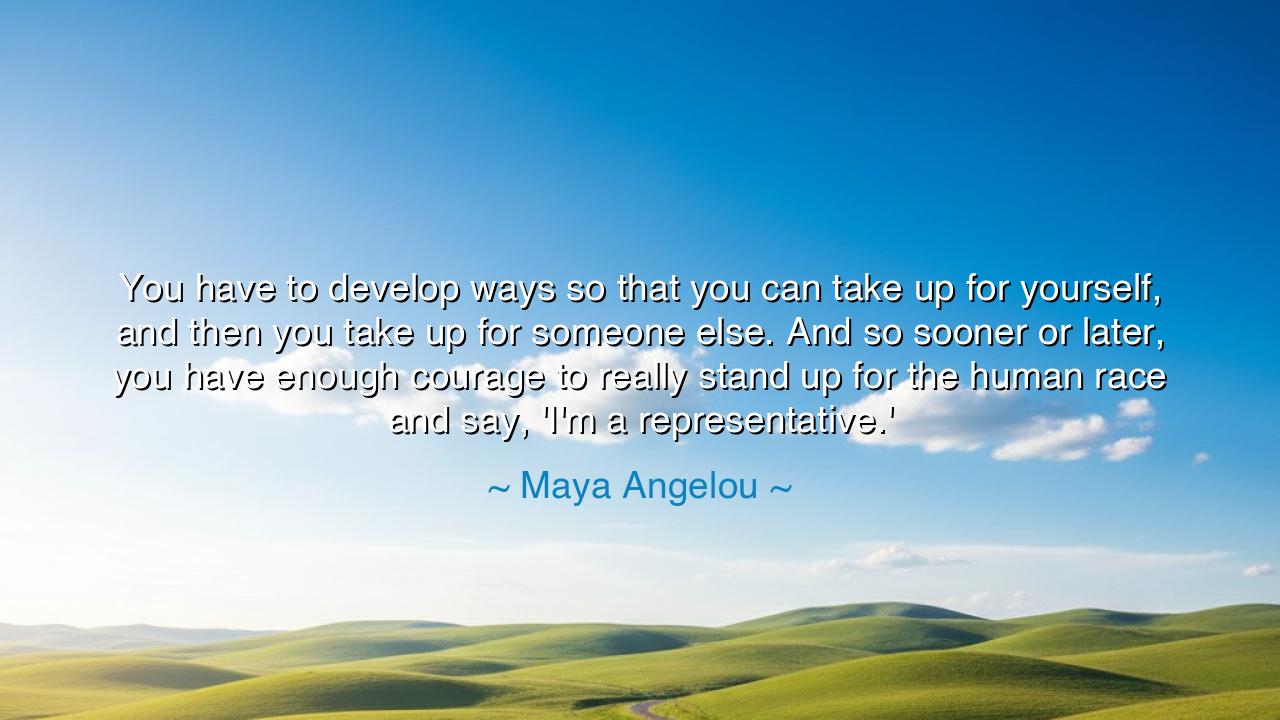
You have to develop ways so that you can take up for yourself
You have to develop ways so that you can take up for yourself, and then you take up for someone else. And so sooner or later, you have enough courage to really stand up for the human race and say, 'I'm a representative.'






Maya Angelou, the poet, prophet, and mother of resilience, once said: “You have to develop ways so that you can take up for yourself, and then you take up for someone else. And so sooner or later, you have enough courage to really stand up for the human race and say, ‘I’m a representative.’” In these words, Angelou speaks of the sacred evolution of courage, the growth of the soul from self-defense to selflessness. Her voice, shaped by both suffering and triumph, reminds us that strength begins within, but must not end there. To defend one’s own dignity is the first act of survival; to defend another’s is the first act of greatness.
The origin of this wisdom lies in the life Angelou herself lived — a life that embodied the struggle from silence to song. As a child, she endured cruelty and trauma that might have broken a lesser spirit. Yet out of that silence she forged a voice that spoke for millions. Through poetry, activism, and compassion, she became a representative of the human race — a bridge between pain and healing, between oppression and hope. Her words are not merely philosophical; they are lived truth. She teaches that one cannot stand for others until one has learned to stand for oneself, for how can you defend another’s light if your own flame is unlit?
In the first stage of courage, one learns self-respect — the power to say, “I will not be diminished.” This is the root of all dignity. The person who cannot take up for themselves is still chained by fear or shame, unable to assert their worth. Angelou understood this deeply: that liberation begins in the soul, and that every human being must first affirm their own right to exist fully, freely, and without apology. But once this courage is born, it cannot remain confined within the self. True strength expands; it reaches outward. It becomes compassion in motion — the will to stand beside others in their suffering, to lift the weak, to shield the voiceless.
This second stage — the courage to take up for someone else — is the foundation of justice. It is the courage of Harriet Tubman, who, having escaped slavery herself, risked her life again and again to lead others to freedom. It is the courage of those who speak against tyranny, even when their own safety trembles in the balance. Such people have learned that humanity is bound by a single fabric; that to heal one’s own wounds is not enough, one must help to mend the world’s. Angelou’s words trace this sacred progression: from self-preservation to solidarity, from individual courage to universal compassion.
Then comes the final transformation — when the spirit becomes vast enough to speak not merely for oneself or one’s tribe, but for all of humanity. This is what Angelou means by standing up and declaring, “I’m a representative.” It is the moment when a person recognizes that they are part of something far greater — that their pain, their joy, their very existence is woven into the destiny of all humankind. Such a person no longer acts for personal victory, but for the honor of the human race. They become, in essence, a vessel for truth, justice, and mercy. This is not arrogance; it is service — the highest calling of the human heart.
Throughout history, the great souls have followed this path. Mahatma Gandhi, who began by defending his own dignity as an Indian man in South Africa, rose to defend the freedom of an entire nation — and, by his example, inspired movements for liberty across the world. Martin Luther King Jr., too, began by taking up for his people, and ended by speaking for all who were oppressed, regardless of color or creed. Each began in the small, personal courage of saying “I deserve to be free,” and ended in the vast, selfless courage of declaring “All people deserve to be free.” This, Angelou tells us, is the journey of the soul toward universal representation — to stand before the world as a voice of conscience and love.
So, my child of light and labor, take this teaching to heart: Begin where you stand. Learn first to defend yourself — not with bitterness, but with truth. Then extend that courage to defend another, and another still. Do not stop at your own doorstep, for the heart that learns to love only itself is still a prisoner. Let your strength become compassion, your voice become a shelter for others. And when the day comes that you can look upon the world — in all its beauty and brokenness — and say, “I stand for us all,” then you will have achieved what Maya Angelou envisioned: the courage of the representative, the one who carries humanity within their heart and speaks with the voice of eternity.
For such courage is not born in a day — it is forged through the fires of both pain and love. Yet once it awakens, it cannot be silenced. It becomes a living force, flowing through every act of kindness, every word of truth, every stand taken for justice. And in that moment, you will know — as Angelou knew — that to stand for humanity is not a burden, but a blessing. For in defending the human race, you fulfill the highest purpose of your own soul.






AAdministratorAdministrator
Welcome, honored guests. Please leave a comment, we will respond soon